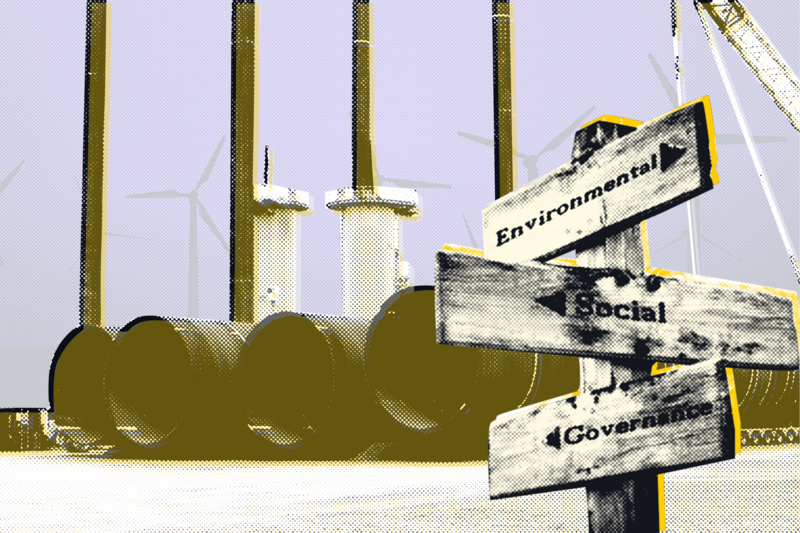There’s no doubt that the impetus to do something to better preserve our environment and better determine if the businesses we invest in are practicing what they preach is not going away.
To be sure, there are concerns from some corporate stakeholders and US lawmakers that sustainability priorities are being prioritized over profit-making at some businesses, and that push-back has even been written into legal mandates applicable to government entities in some US states.
And there’s evidence that sustainability discussions at US corporations are still happening, but more discretely.
The goal of building a more sustainable future and crafting attainable metrics for achieving it is still a priority for businesses, and firms are keen to appease a customer base demanding such metrics, and regulators who expect accurate disclosure about it.
And, in some cases, the issue has become so material to their risk analysis – based on their industry, geographic location or general exposure to climate change-inspired weather events – that they realize that paying close attention to the issue is a business continuity imperative.
Montana’s climate impact ruling
Let’s start with the state of Montana, home to a dozen national parks, historic sites, trails and battlefields.
A state judge on Monday said in her ruling that Montana is violating the rights of young people with policies that prohibit the state from considering climate change effects when it reviews coal mining, natural gas extraction, and other fossil fuel projects.
It was a case brought by 16 plaintiffs who had sued Montana in 2020 when they were ages two to 18; they claimed the state’s permitting of projects like coal and natural gas production exacerbated the climate crisis, violating a 1972 amendment to the Montana constitution requiring the state to protect and improve the environment.
” … fundamental constitutional right to a clean and healthful environment.”
Judge Kathy Seeley
In the June trial, the youths argued that despite its small population and ample parkland, Montana is responsible for an outsized share of global emissions in the country, as it is a major producer of coal, oil and gas that is shipped elsewhere and is also the home of pipelines and other infrastructure needed to ship those fuels.
Judge Kathy Seeley in Helena said the plaintiffs have a “fundamental constitutional right to a clean and healthful environment”.
She said policies that prohibit state agencies from considering climate and emissions impacts when approving fossil fuel projects are unconstitutional.
This is the first youth-led climate case to reach trial in the US and the ruling could influence similar cases nationwide.
California’s Hydrogen Hub
Last week, California Governor Gavin Newsom unveiled plans to establish the state as a clean Hydrogen Hub. The planned Hydrogen Market Development Strategy aims to support California’s clean energy deployment by leveraging hydrogen to reduce emissions in sectors like transportation and industrials.
The strategy, developed in collaboration with state agencies, seeks to tap into federal funding opportunities and create jobs, all while advancing the state’s climate goals.
California is competing to become a federally funded Hydrogen Hub, a program that will leverage $8bn from the bipartisan Infrastructure Investment and Jobs Act.
“California is all in on clean, renewable hydrogen – an essential aspect of how we’ll power our future and cut pollution,” said Newsom. “This strategy will lay out the pathway for building a robust hydrogen market to help us fully embrace this source of clean energy.”
Expanding the market for clean, renewable hydrogen is key to achieving California’s climate goals, Newsom said, especially for a clean electric grid, net-zero carbon emissions, and drastically cutting air pollution.
California is competing to become a federally funded Hydrogen Hub, a program that will leverage $8bn from the bipartisan Infrastructure Investment and Jobs Act (passed with bipartisan support in 2021) to establish at least four Hydrogen Hubs across the US.
Fund managers subpoenaed over ESG disclosures
The Financial Times reported on Tuesday that the enforcement division of the US SEC has sent document requests, including subpoenas, to several asset managers relating to their environmental, social and governance investment marketing this year. The FT said its sources were from a number of asset manager firms.
The SEC’s areas of inquiry are conventional investment funds that have repurposed themselves as ESG funds, plus cases in which funds offered in the US and Europe may share strategies, holdings or portfolio managers but offer differing amounts of information on either side of the Atlantic.
The SEC formed a task force within its enforcement division in March 2021 to better find misconduct in climate and ESG investment disclosures, and the SEC did so in 2022, filing charges against two firms – Goldman Sachs and BNY Mellon.
That could change if and when these regulatory inquiries proceed.
The world’s green bonds
A green bond is a fixed income debt instrument in which an issuer (typically a corporation, government, or financial institution) borrows a large sum of money from investors for use in sustainability-focused projects.
According to a report issued by Intercontinental Exchange, Inc. (ICE), global green bond issuance achieved a new high of $314bn in the first half of the year, with the finance sector leading the way.
Europe remained the largest issuing region, issuing $244bn in impact bonds, with France and Germany being the largest issuing countries in the region, together accounting for 36% of European issuance.
North America issued $42bn in such bonds, a 20% year-on-year drop in first-half issuance due to drops in social and sustainability-linked bonds.
The Asia-Pacific region experienced record issuance of $140bn of green bonds, powered by Japan and Hong Kong, in the second quarter of 2023.
North America issued $42bn in such bonds, a 20% year-on-year drop in first-half issuance due to drops in social and sustainability-linked bonds.
The Middle East issued nearly quadruple the number in Q2 as compared to Q1 – amounting to $7bn – and this came just months before the climate change conference known as COP28 is set to kick off in Dubai in November.

















